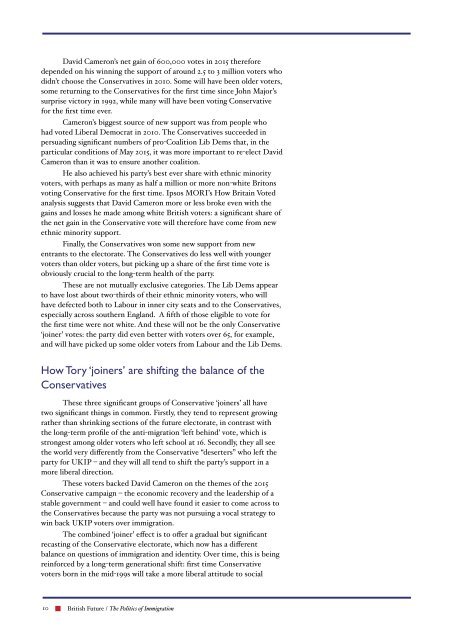THE POLITICS OF IMMIGRATION
The-politics-of-immigration
The-politics-of-immigration
You also want an ePaper? Increase the reach of your titles
YUMPU automatically turns print PDFs into web optimized ePapers that Google loves.
David Cameron’s net gain of 600,000 votes in 2015 therefore<br />
depended on his winning the support of around 2.5 to 3 million voters who<br />
didn’t choose the Conservatives in 2010. Some will have been older voters,<br />
some returning to the Conservatives for the first time since John Major’s<br />
surprise victory in 1992, while many will have been voting Conservative<br />
for the first time ever.<br />
Cameron’s biggest source of new support was from people who<br />
had voted Liberal Democrat in 2010. The Conservatives succeeded in<br />
persuading significant numbers of pro-Coalition Lib Dems that, in the<br />
particular conditions of May 2015, it was more important to re-elect David<br />
Cameron than it was to ensure another coalition.<br />
He also achieved his party’s best ever share with ethnic minority<br />
voters, with perhaps as many as half a million or more non-white Britons<br />
voting Conservative for the first time. Ipsos MORI’s How Britain Voted<br />
analysis suggests that David Cameron more or less broke even with the<br />
gains and losses he made among white British voters: a significant share of<br />
the net gain in the Conservative vote will therefore have come from new<br />
ethnic minority support.<br />
Finally, the Conservatives won some new support from new<br />
entrants to the electorate. The Conservatives do less well with younger<br />
voters than older voters, but picking up a share of the first time vote is<br />
obviously crucial to the long-term health of the party.<br />
These are not mutually exclusive categories. The Lib Dems appear<br />
to have lost about two-thirds of their ethnic minority voters, who will<br />
have defected both to Labour in inner city seats and to the Conservatives,<br />
especially across southern England. A fifth of those eligible to vote for<br />
the first time were not white. And these will not be the only Conservative<br />
‘joiner’ votes: the party did even better with voters over 65, for example,<br />
and will have picked up some older voters from Labour and the Lib Dems.<br />
How Tory ‘joiners’ are shifting the balance of the<br />
Conservatives<br />
These three significant groups of Conservative ‘joiners’ all have<br />
two significant things in common. Firstly, they tend to represent growing<br />
rather than shrinking sections of the future electorate, in contrast with<br />
the long-term profile of the anti-migration ‘left behind’ vote, which is<br />
strongest among older voters who left school at 16. Secondly, they all see<br />
the world very differently from the Conservative “deserters” who left the<br />
party for UKIP – and they will all tend to shift the party’s support in a<br />
more liberal direction.<br />
These voters backed David Cameron on the themes of the 2015<br />
Conservative campaign – the economic recovery and the leadership of a<br />
stable government – and could well have found it easier to come across to<br />
the Conservatives because the party was not pursuing a vocal strategy to<br />
win back UKIP voters over immigration.<br />
The combined ‘joiner’ effect is to offer a gradual but significant<br />
recasting of the Conservative electorate, which now has a different<br />
balance on questions of immigration and identity. Over time, this is being<br />
reinforced by a long-term generational shift: first time Conservative<br />
voters born in the mid-199s will take a more liberal attitude to social<br />
10 British Future / The Politics of Immigration


